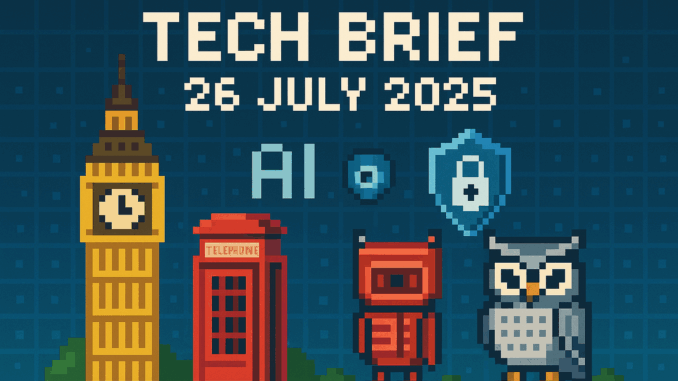
Remember the first time you had to prove your age online? For some, it meant a parent squinting at a floppy disk labelled “Net Nanny,” while others just ticked a box and hoped for the best. Tech Brief 26 July 2025 rounds up the stories shaping our digital lives, from new UK safety laws to AI’s impact on news and a browser deal that changed the web’s DNA. Missed yesterday’s Tech Brief? Catch up here before diving in.
UK Online Safety Act Launches Sweeping Age Verification Rules
Try explaining to a teenager today that once, “parental controls” meant installing software from a 3.5-inch floppy, not uploading your passport to a website. The UK’s Online Safety Act, effective now, demands platforms verify users’ ages and filter harmful content, with fines up to £18 million or 10 percent of turnover for non-compliance. Platforms like Facebook and TikTok are scrambling to implement algorithm-driven age checks, document scans, and third-party verification. Digital rights groups are already raising alarms about privacy and overreach. Since the days of Net Nanny and early browser security prompts, online safety has moved from DIY to centralised control. Now, every new safeguard brings a fresh debate: who decides what’s “safe,” and how do we avoid false positives? For anyone who grew up with simple “Are you over 18?” pop-ups, it’s clear that safety tech has grown up, but so have the stakes.
AI Summaries Slash News Site Traffic by 79 Percent, Study Finds
Imagine clicking on your favourite news site, only to find the stories have already been summarised for you by an algorithm. A new study reveals that Google’s “Overview” feature, which displays AI-generated news snippets in search results, is slashing web traffic for news outlets by up to 79 percent. This shift threatens the survival of independent journalism, as advertising and subscriptions depend on actual visits. The experience used to be more analogue: clicking through endless homepage links, discovering stories by accident, and sometimes falling down a rabbit hole of Usenet threads. Now, AI is flattening the web like a steamroller over a patchwork quilt, leaving only the most visible threads. Industry voices warn that this could shrink the diversity of online voices, reducing the web’s richness to a handful of algorithm-approved highlights. We all remember when discovery was half the fun; now, convenience risks erasing that joy.
AI System Tracks Barn Owl Chicks by Sound, Not Sight
Why are researchers in Bournemouth using AI to count baby barn owls? It’s about conservation and care. The team at Bournemouth University has developed an acoustic AI system that listens for chick calls, tallying them without disturbing fragile nests. This approach builds on a long tradition of British tech ingenuity, from BBC Micro-powered nature projects to today’s machine learning tools. By analysing hours of field recordings, the system can distinguish between adult and chick vocalisations, giving accurate counts without peering into nests. The project’s success on the UK coast hints at a future where technology becomes a gentle partner in wildlife protection. As environmental pressures mount, the blend of grassroots tech and ecological care could set a new standard for conservation, one that values both accuracy and empathy.
Cambridge Consultants CEO Champions UK’s Role in AI and Quantum Innovation
Monty Barlow, CEO of Cambridge Consultants, is not shy about Britain’s strengths in artificial intelligence, quantum computing, and the Internet of Things. In a recent interview, Barlow highlighted Cambridge’s legacy as a tech hub, referencing the city’s roots in classic home computers and the pioneering work behind Acorn and ARM. He argues that long-term research investment is crucial for keeping the UK competitive, even as commercial pressures mount. Over the decades, Cambridge has produced breakthroughs that ripple across the globe. Today’s AI and quantum push builds on that tradition, blending academic rigour with entrepreneurial spirit. For industry and users alike, the message is clear: nurturing homegrown talent and research is vital for shaping the next chapter of digital progress.
From the Wayback Machine
On This Day: 1996 – AT&T and Microsoft announced a major alliance to make Internet Explorer 3.0 the default web browser for AT&T’s WorldNet Internet service. This move intensified the browser wars of the 1990s, as default browser deals became the battleground for user attention. Internet Explorer 3.0 introduced support for HTML 3.2, early CSS, Java applets, and ActiveX controls, all running on a 32-bit architecture. AT&T’s decision shifted the dial-up landscape, making Microsoft’s browser the first web experience for many users. It’s easy to forget the engineers behind these deals, like Thomas Reardon, whose quiet work on Internet Explorer helped shape how millions first experienced the web. These distribution tactics foreshadowed today’s fights over search and browser defaults, where platform choices continue to shape our online journeys.
What This Means
Tech Brief 26 July 2025 reminds us that today’s tech battles are built on decades of innovation and competition. From online safety to browser choices, the push and pull between control, convenience, and discovery remains constant. Let’s stay alert to who sets the rules and how those choices shape our digital lives.
Stay curious, keep your options open, and let’s remember: every tech choice is a piece of history in the making.
Missed yesterday’s Tech Brief? Catch up here.

Leave a Reply